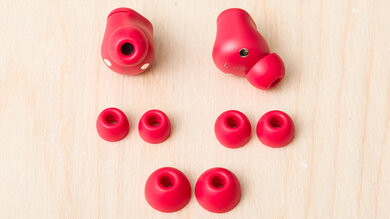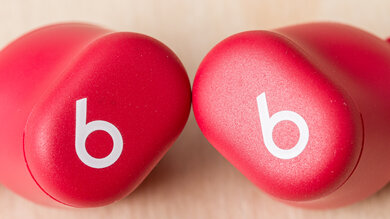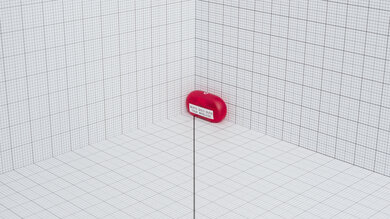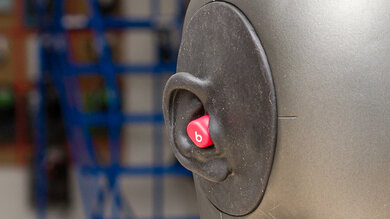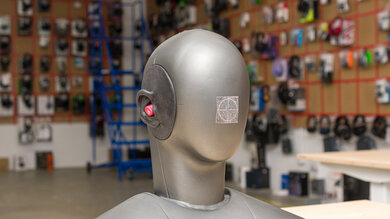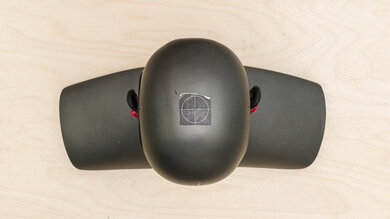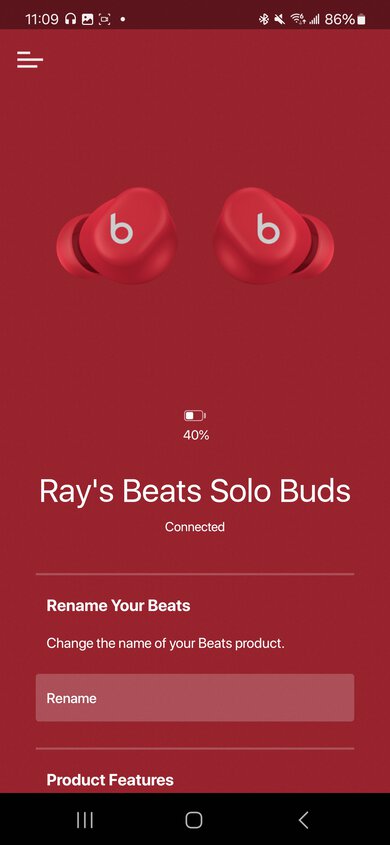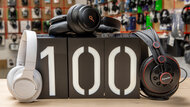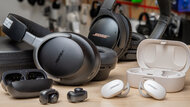The Beats Solo Buds True Wireless are a relatively affordable pair of earbuds within the brand's lineup. They come in four sleek colors, including a 'Transparent Red' that lets you see the electronics inside the buds' case. There's not much to see, though, as the tiny case—Beats' smallest yet — doesn't include a battery for charging the buds on the go. Instead, Beats advertises the buds themselves have an extended 18-hour battery life. You can charge them directly from your phone, tablet, or laptop if you need to top them up. They also support quick pairing and automatic pre-pairing with both Apple and Android ecosystems. So, do these buds pack a big sound despite their small size? Have Beats cut one too many corners in search of a low price in a tiny package? Read on to find out.
Our Verdict
The Beats Solo Buds True Wireless are decent for neutral sound. They have a generally neutral sound profile with a boost in the mid-range that brings voices forward but can also make them sound honky and harsh. They have enough bass to ensure mixes sound full. Their treble range is a bit recessed relative to their prominent mid-range but has a large peak that can make sibilants sound piercing. Their companion app doesn't have an EQ or other sound customization features to help you adjust their sound to your liking. Since they're in-ears, their passive soundstage isn't very speaker-like.
-
Deliver audio very consistently.
-
No EQ or other sound customization features.
The Beats Solo Buds True Wireless are good for commuting and traveling. With an impressive 18-hour battery life, they'll see you through all but the very longest journeys, and their small size and tiny carrying case will easily fit into any pocket. They leak almost no audio, even at high volumes, so fellow passengers won't be annoyed by your audio. On the other hand, since they don't have ANC, these buds do a very poor job of blocking out engine rumble. Their carrying case also doesn't supply any extra charges.
-
Long 18-hour continuous battery life.
-
Fantastic leakage performance.
-
Buds and carrying case are both small and lightweight.
-
Carrying case doesn't hold extra charges.
-
No ANC.
The Beats Solo Buds True Wireless are great for sports and fitness. These small, lightweight buds have a comfortable fit and long battery life that will see you through all-day excursions. On the other hand, they don't have any stability fins, and their seal can be broken with intense head movement, reducing their sound quality. Neither the buds nor the case are certified for water or dust resistance, so bear that in mind when planning your longer runs.
-
Long 18-hour continuous battery life.
-
Buds and carrying case are both small and lightweight.
-
Not certified against water and dust.
The Beats Solo Buds True Wireless are decent for office use. They're small enough to pop into any pocket, even when they're in their case, and their 18-hour battery life means you can get through long days at the office without recharging. Their fantastic leakage performance means you can blast tunes without anyone around you hearing them. On the other hand, their mic is disappointing, they don't have ANC, and they don't support true multi-device pairing, so while you can connect them to two devices at a time, you can't hear audio from both your PC and smartphone simultaneously.
-
Long 18-hour continuous battery life.
-
Fantastic leakage performance.
-
Buds and carrying case are both small and lightweight.
-
Disappointing microphone.
-
No ANC.
-
No true multi-device pairing.
The Beats Solo Buds True Wireless are Bluetooth-only headphones with high latency on PCs, making them unsuitable for gaming. On the other hand, they provide over 18 hours of continuous audio playback and have a comfortable fit.
The Beats Solo Buds True Wireless are truly wireless earbuds; you can't use them wired.
The Beats Solo Buds True Wireless are acceptable for phone calls. Their integrated mic is disappointing and does a mediocre job of separating your speech from background noise. If you need to take calls from busy offices or trains, your conversation partner will find your voice hard to understand. On the upside, these buds have a fantastic leakage performance, so people around you won't hear what the person on the other end of the line is saying.
-
Fantastic leakage performance.
-
Disappointing microphone.
- 7.3 Neutral Sound
- 7.5 Commute/Travel
- 8.0 Sports/Fitness
- 7.0 Office
- 5.4 Wireless Gaming
- 5.2 Wired Gaming
- 6.3 Phone Calls
Changelog
-
Updated Jan 06, 2025:
Several Sound tests have been updated following Test Bench 1.8. There have also been text changes made throughout the review, including to the usages and product comparisons to match these results.
- Updated Dec 16, 2024: We've converted this review to Test Bench 1.8, which updates our target curve and Sound tests. You can read more about this in our changelog.
- Updated Jul 26, 2024: We made small changes to the text for clarity and style.
- Updated Jul 24, 2024: Review published.
- Updated Jul 17, 2024: Early access published.
Check Price
Differences Between Sizes And Variants
The Beats Solo Buds True Wireless come in four colors: 'Matte Black,' 'Storm Grey,' 'Arctic Purple,' and 'Transparent Red.' You can see our model's label here. If you come across another variant of these headphones, please let us know in the comments.
Compared To Other Headphones
The Beats Solo Buds True Wireless' standout feature is their 18-hour continuous battery life. This is much longer than comparable earbuds in their price range, like the OnePlus Buds 3 Truly Wireless, which provide just less than seven hours off a single charge. The downside is that the Beats' case doesn't contain any extra charges, so their overall battery life is much lower than the OnePlus' 40 hours. On the other hand, the Solo Buds don't have active noise cancelling (ANC), unlike more expensive headphones in the Beats lineup, like the Beats Fit Pro True Wireless. Still, these headphones support quick and automatic pairing with other devices in your Apple or Android ecosystems, unlike their more expensive cousins, the Beats Studio Buds + True Wireless.
Check out our recommendations for the best wireless Bluetooth earbuds, the best Beats headphones, the best budget and cheap wireless earbuds, and the best wireless Bluetooth earbuds under $100.
The Beats Solo Buds and the Beats Fit Pro True Wireless are intended for different purposes. The Fit Pro are meant for working out, have added stability fins, and are IPX4 rated against water splashes. On the other hand, the Solo deliver audio more consistently between wears and can be connected to two devices at once (though you can only listen to audio from one device at a time). The Fit Pro also have a more neutral sound with less honk in the mid-range, but they're significantly more expensive than the Solo.
The Beats Solo Buds are slightly worse headphones than the Beats Studio Buds + True Wireless. Not only do the Buds + have ANC and do a much better job blocking out engine rumble, they also have easier-to-use controls and a case with extra charges. On the other hand, the Solo Buds have a much longer continuous battery life, and they deliver audio much more consistently from wear to wear.
The Samsung Galaxy Buds FE are much better headphones than the Beats Solo Buds. The Samsung have excellent ANC that blocks out way more sound than the ANC-less Beats. They also have a much better microphone and give you the option to adjust the sound via the EQ presets. On the other hand, the Beats have a better continuous battery life, and you can pair them to two devices at the same time (though you can't listen to audio from both devices simultaneously).
The Beats Solo Buds are slightly better than the Beats Studio Buds True Wireless. The Solo have better noise isolation, a better mic, and a far superior battery life. They also supply more thump in the bass, which might be important for anyone who chooses Beats because of their famed low-end. On the other hand, the Studio Buds deliver audio a little more consistently.
The Beats Solo Buds and the Sony LinkBuds S Truly Wireless are similar in-ears, but the Sony are better in a few ways. The Sony have active noise cancellation (ANC), which does a great job blocking out ambient conversations and engine rumble. Sony's companion app includes a graphic equalizer and presets to customize your audio experience. On the other hand, the Beats boast superior continuous battery life but lacks extra charges from the case.
The Beats Solo Buds are better for most people than the Apple AirPods (3rd generation). The Beats have much better battery life and significantly better compliance with our target curve in the bass range. The in-ear Beats also do a much better job blocking out office chatter and A/C hum, and they offer four sizes of silicone tips if you don't like the one-size-fits-all earbuds of the AirPods. On the other hand, the AirPods are rated IPX4 against water splashes while the Beats don't have a rating against either water or dust.
Test Results
The Beats Solo Buds True Wireless are the most affordable true wireless earbuds in the company's lineup. They're made of plastic and come in four colors: 'Matte Black,' 'Storm Grey,' 'Arctic Purple,' and 'Transparent Red.' We tested the 'Transparent Red' version, which allows you to see the circuitry inside the case. These headphones display the Beats logo on the side, slightly adjacent to the multifunctional control button. Like the Beats Studio Buds + True Wireless, they have small acoustic vents to help improve their bass response and relieve ear pressure.
The Beats Solo Buds True Wireless are decently comfortable. Unlike the Beats Studio Buds + True Wireless, inserting the buds into the ear can create a painful suction feeling, as can using their buttons, because doing so forces you to briefly push the buds deeper into your ear canal. They come with four sizes of tips, and once you find a snug fit, these buds deliver audio very consistently. That said, you may find all of these sizes uncomfortable, depending on the shape of your inner ear. If you want to avoid that plunger-like feeling, using a smaller tip can lead to increased comfort but a drop in audio quality, particularly in the bass region. You may have to experiment with the different tip sizes to find the best balance between sound quality and comfort.
These buds have disappointing controls. While operating the buttons themselves is straightforward, they're a bit stiff, so using them requires pushing the buds further into your ear canal, which can cause pain. A mechanical click lets you know you've successfully pushed a button, but there's no audio signal to confirm this. There also aren't unique controls for the left and right buds: you're limited to the same controls on each. By default, the buds don't control volume, so you'll have to use your device for that, but you can change this in their companion app's settings. Unfortunately, doing so means you can't activate Siri voice control from the buttons for hand-free control of things like volume and track skipping.
You can view their control scheme for controlling audio here and their control scheme for controlling calls here.
These buds have a decent carrying case. It's made of solid-feeling plastic that will protect the buds well without looking especially fancy while doing so. The case's tiny size and low weight make it super easy to slip into a pocket for transportation, but that's because it doesn't have its own battery to allow you to recharge these buds on the go. If you want to recharge them, you'll have to place the buds in the case and connect it to a power source via its USB-C port. Unlike the Beats Studio Buds + True Wireless, the case has no indicator light to show you how full the battery is. You'll have to check their battery level on your linked device.
The Beats Solo Buds True Wireless have good build quality. The buds and the case are made of solid-feeling plastic, and the case's hinge seems strong. That said, neither the buds nor the case have an IP rating against water or dust, so these aren't the best choice for your run on a drizzly day. The printed text on the buds also looks like it'll wear out easily from regular use: the printed 'L' and 'R' on our buds faded slightly while going through our testing process.
Once in your ears, the Beats Solo Buds True Wireless have a good, stable fit. Their fit loosens with use, but even headbanging to your favorite metal tunes won't cause these to completely fall out. If you're looking for buds that are better suited to working out, the Beats Fit Pro True Wireless have stability fins that help keep the buds locked in place.
The Beats Solo Buds True Wireless have a somewhat neutral sound profile that emphasizes the mid-range. They deliver enough warmth and punch to keep mixes from sounding thin, but a peak in the high-mid and low-treble region gives these headphones a slightly honky, and at times harsh, quality. Their treble is slightly recessed relative to the mid-range, which emphasizes the buds' mid-forward character, but a big peak in the mid-treble can make sibilants sound harsh.
It's worth noting that the frequency response of these headphones changes slightly when using their microphone: the low-end and top-end are heavily reduced, producing a mid-range sound focused on the frequency range of the human voice. The Solo Buds' companion app also doesn't have an EQ to customize the buds' sound to your liking.
The Beats Solo Buds True Wireless have fantastic frequency response consistency. Once you get a good fit, they deliver consistent audio with every wear. It's important to note that we found the earbud tips that delivered the most consistent audio were also a bit painful to insert and that the more comfortable tips tended to produce less consistent bass. It's worth experimenting to find a good balance between comfort and sound.
These buds have outstanding bass target compliance. They offer a little more bass than our target curve in the low-bass, adding thump to kick drums. However, the entire bass region is almost flat, so basslines sound balanced regardless of the pitch of the individual notes played. In songs like Caribou's All I Ever Need, the loud 808 bassline sounds suitably thumpy yet still controlled.
The Beats Solo Buds True Wireless have decent mid-range target compliance. A dip in the low-mids can make vocals sound a little thin but also ensures busy mixes don't get muddy. The mid-mids are well-balanced, so vocals and instruments sound present and full. A peak in the high-mids pushes vocals and instruments to the front of the mix, making them sound a bit harsh with some audio. In songs like Africa by TOTO, the elevated high-mid range can cause the vocals in the final chorus to sound somewhat honky, particularly when contrasted with the guitar, which appears noticeably more recessed in the mix.
These earbuds have alright treble accuracy. The elevated low-treble can make vocals sound a touch harsh, while a couple of peaks and dips in the mid-treble render drum cymbals alternately muffled or harsh. Overall, the treble is low relative to the mid-range, which is part of what lends these earbuds their somewhat honky sound.
The peaks and dips performance is great, meaning the buds generally follow their own sound profile well. A broad peak that starts in the high-mids and continues up into the mid-treble makes vocals sound a bit honky and harsh, while two sharp peaks and dips in the mid-treble make sibilants alternately dull or piercing, depending on their pitch.
The Beats Solo Buds True Wireless have excellent imaging performance. This is unsurprising, as Beats typically maintain high standards of quality control, leading to the production of headphones with well-matched drivers. This is vital for achieving precise imaging, as it allows for the accurate placement of elements, like instruments, within the stereo field. However, imaging can differ from one unit to another.
Our unit's L/R drivers display only a little mismatch in phase. In real-life contexts, the small peak in phase difference in the mid-range is inaudible. In songs like Hello by Adele, the vocals sound properly placed, present, and detailed.
The Beats Solo Buds True Wireless have a poor passive soundstage, which is typical for in-ear headphones. Since the audio doesn't interact with the outer ear, the listening experience feels narrow and confined rather than broad and enveloping. It seems as though the sound is originating from within your head instead of from speakers in a room.
Unlike the Beats Studio Buds + True Wireless, the Beats Solo Buds True Wireless don't support Apple's Spatial Audio or Dolby Atmos.
The weighted harmonic distortion performance is very good. Most frequencies fall within good limits. A couple of peaks in the bass region and another broader peak in the low- and mid-treble regions will be inaudible to all but the most discerning audiophiles. In general, these headphones reproduce audio clearly and purely.
These are the settings used to test the Beats Solo Buds True Wireless. Our results are only valid when used in this configuration.
The Beats Solo Buds True Wireless' noise isolation performance is adequate. Unlike the Beats Studio Buds + True Wireless, these headphones don't have active noise cancelling (ANC). Still, their passive isolation (achieved via the seal of the ear tips in your ear canal) is strong in the mid-range and treble region, where they do a good job blocking out sounds like office chatter and the high-pitched hum of A/C units. However, their lack of ANC shows in the bass region. These buds do a poor job of blocking out the rumble of bus engines.
It's worth noting that the peak above zero in the low-bass shown on our graph is only produced when using our testing rig. We don't expect you to encounter this.
These buds do a passable job of blocking out irregular sounds like those you'd encounter in real life, like the sounds of an airplane's engines, office chatter, and street noise. But their lack of ANC means they do a poor job blocking out more rumbly sounds like engines.
The significant peak in the low-bass range displayed on our graph is a byproduct of our testing procedure, and we don't expect it to occur in typical usage scenarios.
These buds have fantastic leakage performance, which is a slight improvement on the Beats Studio Buds + True Wireless. Escaping audio is concentrated in the mid-treble and mid-bass regions, so it will sound fairly hollow to anyone around you who manages to hear it. You can blast your favorite tunes at a high volume without bothering others, so long as you've established a good fit beforehand.
The mic's disappointing recording quality is even worse than the mediocre mic on the Beats Fit Pro True Wireless. It emphasizes the high-mids and treble ranges while heavily reducing lower frequencies, resulting in clear but tinny-sounding speech that lacks body. The mic also doesn't capture much audio in the mid- and high-treble ranges, so your voice will lack a little air and sparkle. That said, your speech will be comprehensible. The buds' integrated noise removal system produces an inaudible artifact above most people's hearing range, which is additionally amplified by our testing rig. It will not affect your experience with these earbuds.
The mic's noise-handling performance is unremarkable. Your voice will remain audible with consistent background noise, as the mic's system does a good job of removing steady-state sounds. Unfortunately, its noise-handling system leaves your voice sounding a little distorted, with audible artifacts. When it comes to real-life sounds, like the noise of a subway, the mic fares worse. The internal noise gate takes a short time to work, leaving snippets of background noise in your audio that your caller will find distracting. The loud sound of the subway train also completely overloads the mic system, creating very noticeable distortion and other artifacts. During such moments, anyone on the other end of the line will have a very hard time understanding what you're saying.
The Beats Solo Buds True Wireless have great battery performance. The manufacturer advertises them as having 18 hours of continuous playback time. We measured just over this while playing audio at a volume of 50%, which is outstanding for a pair of earbuds. Still, battery life varies depending on use and volume. They also have a 'Fast Fuel' feature, where a five-minute quick charge provides an hour of playback time.
It's important to note that these buds are slightly unusual. Unlike other models, like the Beats Studio Buds + True Wireless and the Beats Fit Pro True Wireless, their carrying case does not contain any extra charges. It will only charge the buds if it is connected to a power source like a phone, laptop, or USB-C wall adapter. This means you get a longer continuous battery life but lose out on extra charge from the case. That lack of extra charges is why the buds don't score as well as you might expect based on their remarkable continuous battery life. Unfortunately, these headphones don't come with a USB cable, so you have to use your own.
The Beats Solo Buds True Wireless have a passable companion app. You can see a video of how it works on Android here and can check out a screenshot of the iOS interface here. The app allows you to rename and register your buds, configure their voice assistant, adjust the case's Bluetooth pairing tones, and enable auto-updates. You can also change the mapping of call controls. Finally, you can assign the long press of the earbuds' buttons to change the volume of your audio, but then you lose out on the voice assistant. Unfortunately, it doesn't have an EQ to customize the sound to your preferences.
The case has a USB-C port for charging the buds, but you'll have to bring your own cable as one isn't included.
The Beats Solo Buds True Wireless have excellent Bluetooth connectivity. While they don't have one of Apple's H1 or H2 chips, they still support quick pairing with both Android and iOS devices. You can also pair them to two devices at a time, but you can't listen to audio from both devices at the same time. Still, switching is easy and not disruptive. These buds have somewhat high latency, so your audio and visuals might not stay in sync while streaming video, but it's important to note that different apps and devices compensate for latency differently.
You can pair these headphones with Bluetooth-enabled PCs with full simultaneous audio and microphone functionality. However, they don't support any other connection method to your PC.
These headphones come with a carrying case for storing and transporting the buds. The case doesn't have a battery and won't charge the buds unless a cable is plugged into its USB-C port. The case lacks wireless charging support.
Comments
Beats Solo Buds: Main Discussion
Let us know why you want us to review the product here, or encourage others to vote for this product.
Update: Several Sound tests have been updated following TB 1.8. There have also been text changes made throughout the review, including to the usages and product comparisons to match these results.



